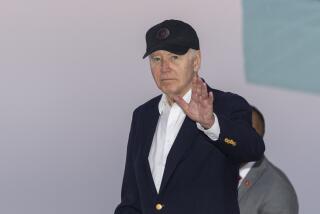U.S. Jews Assist Israelâs Immigrants
JERUSALEM â For three days, the American Jewish visitors heard speeches by Israeli leaders, visited Soviet and Ethiopian Jewish immigrants and were lodged and dined in a style fit for the rich.
Now, as another sumptuous meal was about to start, the crunch began. The philanthropists, who had pledged $100,000 to be invited on this trip, made their donations. One businessman promised $325,000. Another upped his pledge from $85,000 to $120,000.
In the back of the room, fund-raising organizers tapped out the pledges on calculators. The result: 128 American Jewish philanthropists pledged a record $40 million in one night.
âThis is an extraordinary accomplishment,â said Marvin Lender, national chairman of the United Jewish Appeal.
The gathering, called the Prime Ministerâs Mission to Israel, highlighted what activists call the tremendous response by American Jewry to the massive immigration by Soviet and Ethiopian Jews to Israel. United Jewish Appeal administrators say they are confident that they will raise a targeted $1.2 billion for the immigration effort despite the doldrums of the U.S. economy.
At the same time, Jewish fund-raisers are faced with hard choices for the future with a shrinking Jewish community and a new generation of American Jews who donât have anywhere near the commitment of their parents.
So far, the United Jewish Appeal keeps on breaking records with what administrators say is a formula based on appealing to the emotions and interests of the American Jewish community.
Take the Prime Ministerâs Mission. Most of the delegation consisted of American Jewish communal leaders, businessmen who as they near retirement have become more involved in Jewish life. But there were also young people who welcomed the opportunity to rub shoulders with the powerful and make new business connections.
âDeals are made, but thatâs not my motivation,â said Morris Silverman, the 57-year-old vice president of the San Diego Jewish Federation.
Sitting next to Silverman on a special jet that took the philanthropists was his son, Kenneth. It was Kennethâs first visit to Israel since his bar mitzvah nearly 18 years ago.
âI was very touched when I saw the Soviet Jews arriving,â said the younger Silverman, who works with his father in financial services. âI had heard about the Soviet and Ethiopian Jews, but I never saw them.â
Organizers of the trip understood the emotional impact as well. They brought the delegation to Ben-Gurion Airport to meet the Soviet arrivals hours before the pledges began. The sight even moved an experienced politician like Rudy Boschwitz, a former U.S. senator from Minnesota who was President Bushâs special envoy to rescue Ethiopian Jews.
âThe idea now is for us to go back to our communities and inspire others to contribute,â Boschwitz said.
The long-term prospects of this goal are not easy to predict. Appeal administrators acknowledge that Israel simply does not strike a receptive chord among many young American Jews. Many of them have married out of the faith and are simply uninterested. Others donât view Israel as a haven for Jews that is battling for survival.
âWe have a university program,â said an Appeal official. âIt just didnât attract any interest on campus.â
The Jewish philanthropy has also had to decide what to do with Christian donors. Intermarriage has not hurt the fund-raising, Appeal sources said, because many of the non-Jewish spouses have become active in the effort.
More to Read
Sign up for Essential California
The most important California stories and recommendations in your inbox every morning.
You may occasionally receive promotional content from the Los Angeles Times.




![[20060326 (LA/A20) -- STATING THE CASE: Marchers organized by unions, religious organizations and immigrants rights groups carry signs and chant in downtown L.A. "People are really upset that all the work they do, everything that they give to this nation, is ignored," said Angelica Salas of the Coalition of Humane Immigrant Rights. -- PHOTOGRAPHER: Photographs by Gina Ferazzi The Los Angeles Times] *** [Ferazzi, Gina -- - 109170.ME.0325.rights.12.GMF- Gina Ferazzi/Los Angeles Times - Thousands of protesters march to city hall in downtown Los Angeles Saturday, March 25, 2006. They are protesting against House-passed HR 4437, an anti-immigration bill that opponents say will criminalize millions of immigrant families and anyone who comes into contact with them.]](https://ca-times.brightspotcdn.com/dims4/default/34f403d/2147483647/strip/true/crop/1983x1322+109+0/resize/840x560!/quality/75/?url=https%3A%2F%2Fcalifornia-times-brightspot.s3.amazonaws.com%2Fzbk%2Fdamlat_images%2FLA%2FLA_PHOTO_ARCHIVE%2FSDOCS%2854%29%2Fkx3lslnc.JPG)





